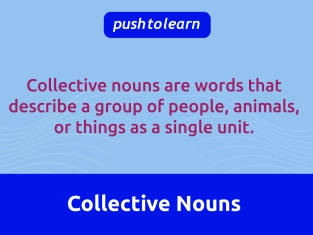by PushtoLearn
Noun Phrases
Table of Contents
Noun Phrases Exercises
These exercises focus on Noun Phrases.
What Is a Noun Phrase?
A noun phrase is a phrase that acts as a noun in a sentence.
✅ Basic Noun Phrases (Single Noun or Pronoun)
-
People like to have money.
-
I am tired.
-
She bought a car.
✅ Expanded Noun Phrases (With Modifiers)
-
The small black cat sat on the roof.
-
A boy in a red jacket was running.
-
Their many interesting books are on the shelf.
📌 Key Rule: Every noun phrase must have a main noun (the head noun), but it can include other words that describe or modify the noun.

Premodifiers in Noun Phrases
Premodifiers come before the noun and describe it. These include:
🔹 Determiners (the, a, my, those)
🔹 Quantifiers (many, some, all)
🔹 Numbers (two, six, fifty)
🔹 Adjectives (beautiful, big, red)
✅ Word Order for Premodifiers
Determiner/Quantifier → Number → Adjective(s) → Noun
|
Determiners & Quantifiers |
Numbers |
Adjectives |
Noun |
Example |
|
The |
two |
young |
boys |
The two young boys are playing. |
|
My |
three |
best |
friends |
My three best friends are coming. |
|
Some |
six |
delicious |
cakes |
Some six delicious cakes were on the table. |
|
All those |
many |
important |
documents |
All those many important documents are in the office. |
📌 Example Sentences:
-
My little sister is learning to read.
-
Those three old books belong to my grandfather.
-
All his expensive cars are in the garage.
✅ If there are multiple adjectives, we follow this order: opinion → size → age → color → origin → material → purpose
📌 Example: A beautiful small old blue Italian leather handbag
Postmodifiers in Noun Phrases
Postmodifiers come after the noun and add more information. These include:
|
Postmodifier Type |
Example |
|
Prepositional phrase |
The man with a hat |
|
-ing phrase |
The girl sitting by the window |
|
Relative clause |
The book that I borrowed |
|
That-clause |
The idea that we should leave |
|
To-infinitive |
Something to eat |
✅ Examples of Postmodifiers in Noun Phrases:
|
Type |
Example Sentence |
|
Prepositional Phrase |
The house on the hill is expensive. |
|
-ing Phrase |
The man walking down the street is my teacher. |
|
Relative Clause |
The girl who won the race is my friend. |
|
That-Clause |
The fact that he left early surprised us. |
|
To-Infinitive |
I need something to drink. |
📌 More Examples:
-
The cat on the sofa is sleeping. (prepositional phrase)
-
The woman talking to the manager looks worried. (-ing phrase)
-
The movie that we watched last night was amazing. (relative clause)
-
I have no time to waste. (to-infinitive)
✅ Multiple Postmodifiers in One Sentence:
-
A young girl in a blue dress holding a teddy bear who looked lost.
Combining Premodifiers & Postmodifiers in Noun Phrases
A noun phrase can contain both premodifiers and postmodifiers to give a detailed description.
✅ Example Sentences:
-
The three talented musicians from Spain performed last night.
-
(Premodifiers: The three talented | Postmodifier: from Spain)
-
A beautiful house by the lake with a red roof.
-
(Premodifiers: A beautiful | Postmodifiers: by the lake, with a red roof)
-
All those delicious homemade cookies on the plate.
-
(Premodifiers: All those delicious homemade | Postmodifier: on the plate)
📌 Fun Fact: This is how descriptive writing is created—by using expanded noun phrases!
Common Mistakes & How to Avoid Them
🚫 Mistake 1: Incorrect Order of Premodifiers
❌ A red small car
✅ A small red car (size before color!)
🚫 Mistake 2: Forgetting Determiners
❌ I saw big dog in the park.
✅ I saw a big dog in the park.
🚫 Mistake 3: Using Too Many Postmodifiers Without Clarity
❌ The boy in the corner with the hat talking loudly in the room full of people
✅ The boy in the corner, wearing a hat, talking loudly, in a crowded room.
🚫 Mistake 4: Confusing Prepositional Phrases with Adjective Phrases
❌ The car is near the blue house. (not a noun phrase, just a prepositional phrase)
✅ The car near the blue house is mine. (now it’s a noun phrase!)
FAQs About Noun Phrases
What is the head noun in a noun phrase?
The head noun is the main noun in the phrase.
📌 Example: In "The beautiful old castle on the hill", the head noun is castle.
Can a noun phrase be just one word?
Yes! A single noun or pronoun can be a noun phrase.
📌 Example: She is my friend. (She = noun phrase)
What is the difference between a noun phrase and a clause?
A noun phrase does not have a verb, while a clause does.
📌 Example:
-
The book on the table (Noun phrase – no verb)
-
The book that is on the table (Clause – has a verb "is")
Can a noun phrase start a sentence?
Yes! A noun phrase can be the subject of a sentence.
📌 Example: The tall man with glasses is my professor.
Why are noun phrases important?
Noun phrases make sentences more descriptive and give detailed information.

